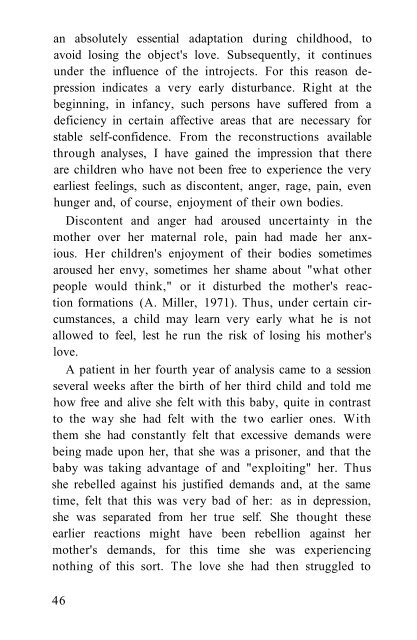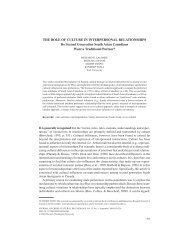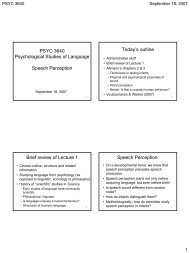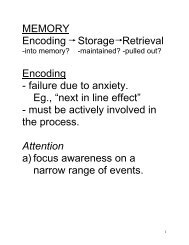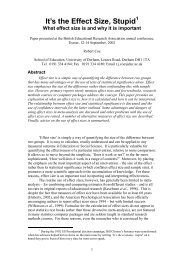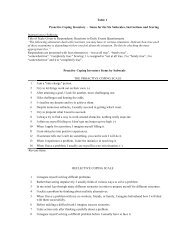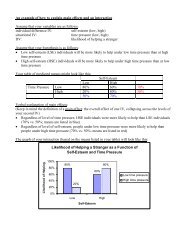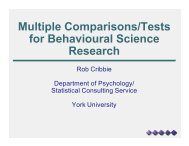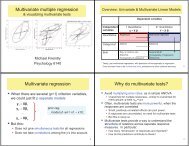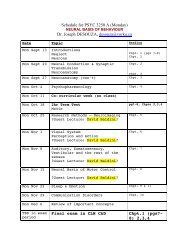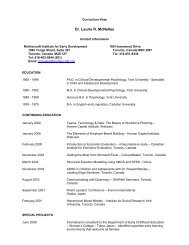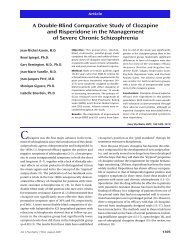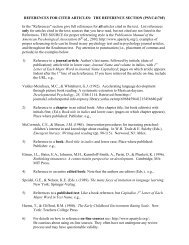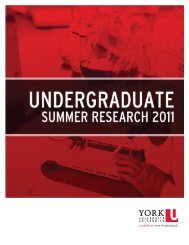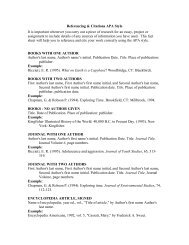The Drama of the Gifted Child (The Search for the True Self)
The Drama of the Gifted Child (The Search for the True Self)
The Drama of the Gifted Child (The Search for the True Self)
Create successful ePaper yourself
Turn your PDF publications into a flip-book with our unique Google optimized e-Paper software.
an absolutely essential adaptation during childhood, to<br />
avoid losing <strong>the</strong> object's love. Subsequently, it continues<br />
under <strong>the</strong> influence <strong>of</strong> <strong>the</strong> introjects. For this reason depression<br />
indicates a very early disturbance. Right at <strong>the</strong><br />
beginning, in infancy, such persons have suffered from a<br />
deficiency in certain affective areas that are necessary <strong>for</strong><br />
stable self-confidence. From <strong>the</strong> reconstructions available<br />
through analyses, I have gained <strong>the</strong> impression that <strong>the</strong>re<br />
are children who have not been free to experience <strong>the</strong> very<br />
earliest feelings, such as discontent, anger, rage, pain, even<br />
hunger and, <strong>of</strong> course, enjoyment <strong>of</strong> <strong>the</strong>ir own bodies.<br />
Discontent and anger had aroused uncertainty in <strong>the</strong><br />
mo<strong>the</strong>r over her maternal role, pain had made her anxious.<br />
Her children's enjoyment <strong>of</strong> <strong>the</strong>ir bodies sometimes<br />
aroused her envy, sometimes her shame about "what o<strong>the</strong>r<br />
people would think," or it disturbed <strong>the</strong> mo<strong>the</strong>r's reaction<br />
<strong>for</strong>mations (A. Miller, 1971). Thus, under certain circumstances,<br />
a child may learn very early what he is not<br />
allowed to feel, lest he run <strong>the</strong> risk <strong>of</strong> losing his mo<strong>the</strong>r's<br />
love.<br />
A patient in her fourth year <strong>of</strong> analysis came to a session<br />
several weeks after <strong>the</strong> birth <strong>of</strong> her third child and told me<br />
how free and alive she felt with this baby, quite in contrast<br />
to <strong>the</strong> way she had felt with <strong>the</strong> two earlier ones. With<br />
<strong>the</strong>m she had constantly felt that excessive demands were<br />
being made upon her, that she was a prisoner, and that <strong>the</strong><br />
baby was taking advantage <strong>of</strong> and "exploiting" her. Thus<br />
she rebelled against his justified demands and, at <strong>the</strong> same<br />
time, felt that this was very bad <strong>of</strong> her: as in depression,<br />
she was separated from her true self. She thought <strong>the</strong>se<br />
earlier reactions might have been rebellion against her<br />
mo<strong>the</strong>r's demands, <strong>for</strong> this time she was experiencing<br />
nothing <strong>of</strong> this sort. <strong>The</strong> love she had <strong>the</strong>n struggled to<br />
46


